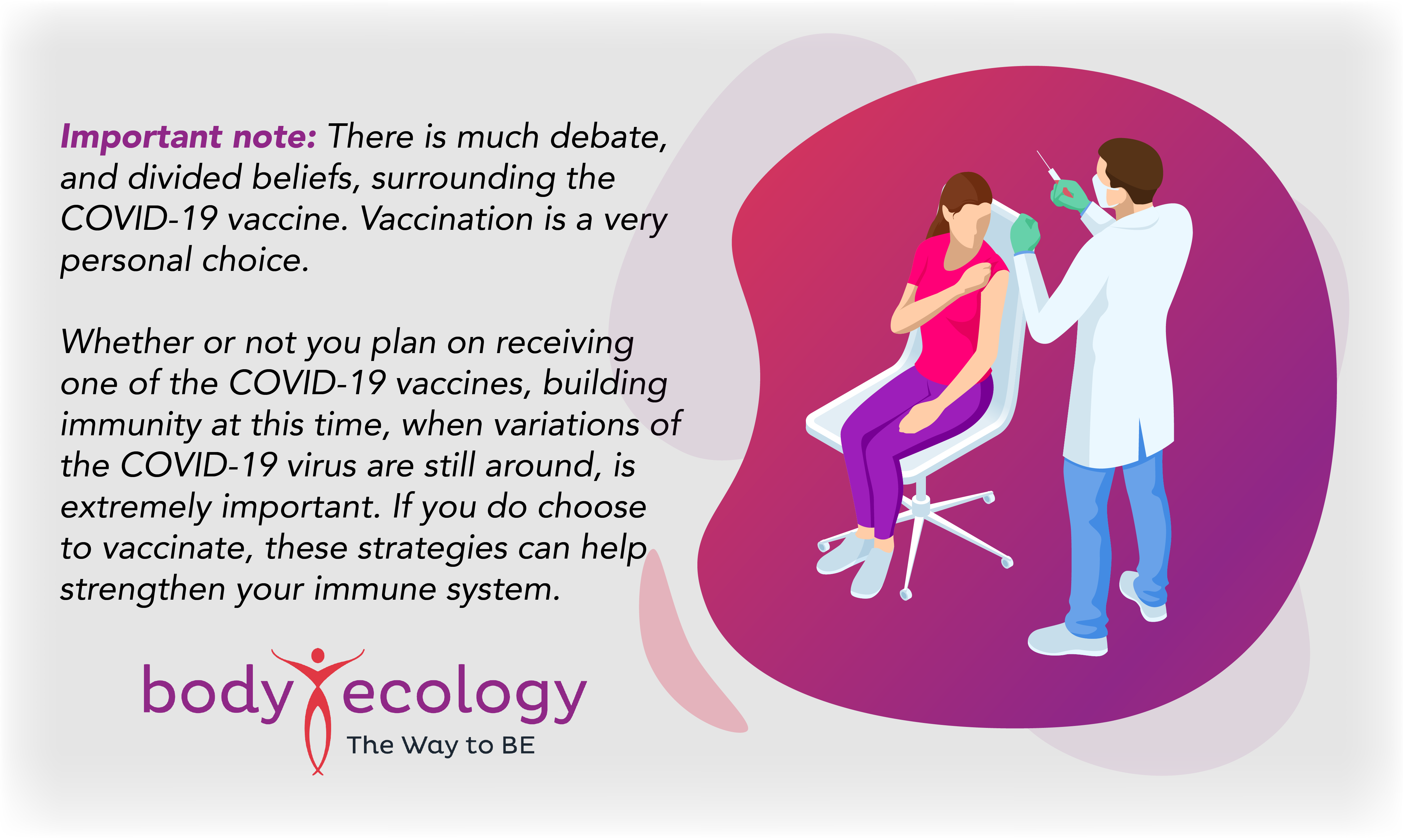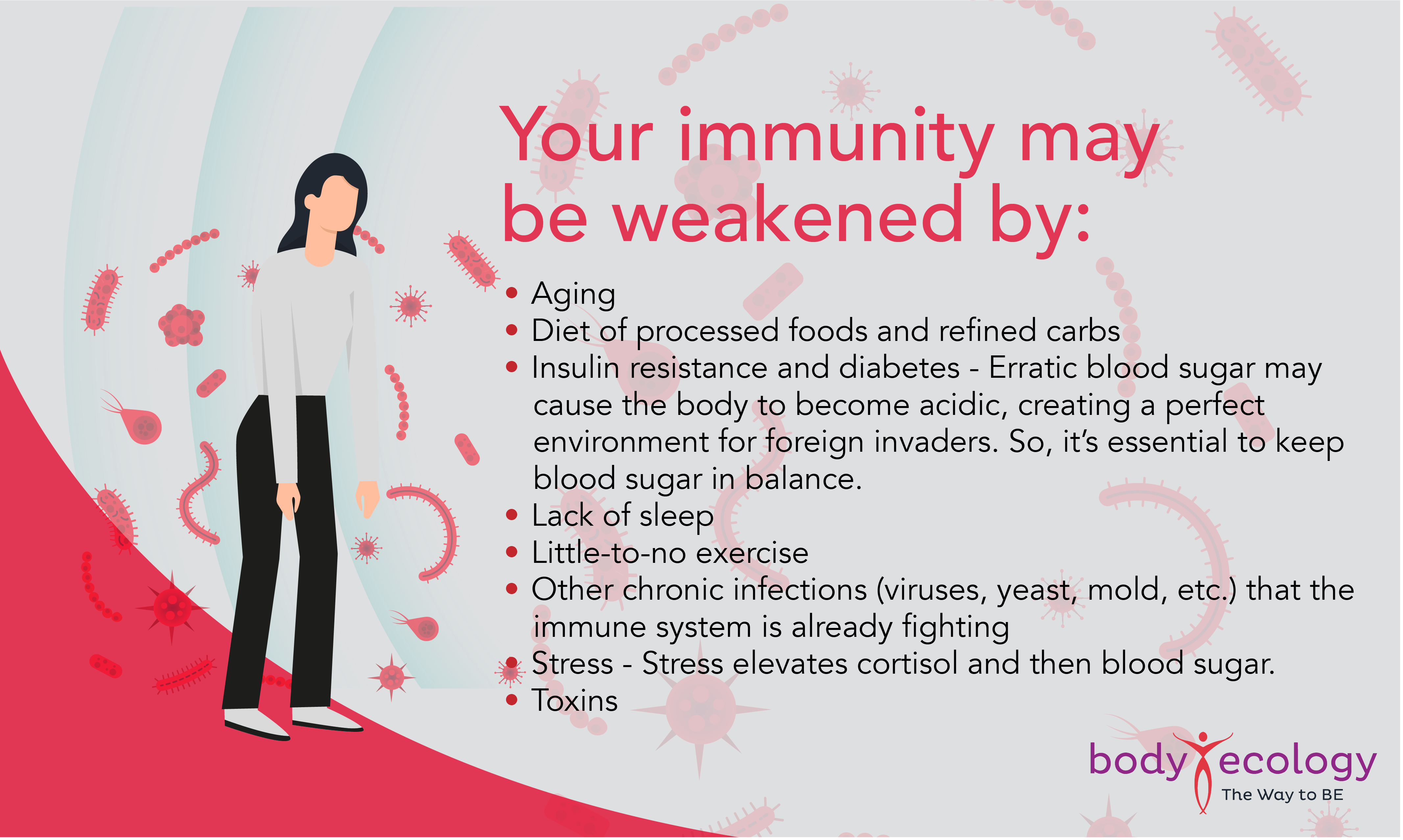
If you choose to vaccinate: BE prepared (and not just for a COVID vaccine)
*Please note, this article series is meant to provide you with information on how to strengthen your immune system in the event you decide to get vaccinated. I am in no way stating that you should or should not get vaccinated, nor am I stating that I am pro or anti-vaccine.
In the past, widespread vaccination programs have successfully eradicated devastating and deadly diseases, like smallpox and (for the most part) polio. They’ve also helped control the spread of less dangerous illnesses, like measles, mumps, rubella (this triple vaccine combo is given at around 18 months), and a wide range of other diseases.

The whole concept of a successful immunization was that you vaccinate a person with a strong, hardy immune system, and they would form antibodies and build an immune response to that virus.

Therefore, it’s unfortunate, but those most vulnerable to infections — namely, older adults, who usually have a weakened immune system, and babies — are less responsive to vaccinations, making vaccines less effective for those at the highest risk.
Note from Donna: Parents need to know that babies don’t even have an immune system for at least the first six months to a year of life. So, expecting an infant’s immune system to fight an infection is asking a lot. Before the days of antibiotics, parents were very careful to keep their babies — especially those born in the winter — indoors and away from others. It was well-known that babies could die in the first few years of life.
At Body Ecology, we have taught that as soon as the baby is born, the focus needs to be on developing a rich microbiome in the baby’s gut. A robust microbiome living in the gut with a wide diversity of microbes is essential to a hardy immune system at any age.
How does your immunity influence how well you’ll respond to a vaccine?
Seventy percent of your immune system is housed in the gut-associated lymphatic tissue. The microbes living there flourish on a diet rich in plant-based fiber and certain fermented foods and drinks. This is the secret to creating a diverse microbiome, and diversity is key.
When the gut is populated with many different species, these tiny alchemists help keep their environment clean, metabolize nutrients, protect the gut lining from foreign invaders, and stimulate immune function. They also support an effective vaccine response.
In this article series, we look at probiotics and other natural ways to enhance vaccine response — helping you to prepare your body to receive the vaccine if you choose to vaccinate in order to travel somewhere, to attend school, or to keep your job. What you’ll read here is also true for next year’s “seasonal flu” or for any future supplemental vaccines.
But first, it’s critical to understand what contributes to lower immunity in the first place, especially in certain populations — i.e., older people or those with what are considered “compromised” immune systems. Unfortunately, that’s many millions of us right now.

All of these may contribute to insulin resistance and may make the blood too acidic.1-3 Viruses and other pathogens love this acidic environment. Minerals help stabilize blood sugar levels.4
Age-related immune decline, AKA immune senescence: What causes it?
Senescence is the scientific term for aging. Immune senescence, then, reflects the reduced ability in older adults to respond to pathogens that may allow infection and disease to take hold.
Immune senescence also means:
- You don’t have enough immune cells (white blood cells) called lymphocytes to fight an infection.
- Weaker cells do not reproduce properly or at all.
- You’re more likely to have an impaired response to vaccination so, even when vaccinated, you may not produce sufficient levels of antibodies to prevent infection.
- An impaired ability to make hardy lymphocytes may increase the likelihood of reactivation of latent viruses, like herpes, Epstein Barr, and cytomegalovirus, which are common in all of us.
In short, those who most need protection against influenza, COVID-19, and other diseases through use of an effective vaccination are also least likely to respond appropriately to a vaccine.
This may not be fair, but it’s life. Brutal; but nature doesn’t really want people hanging on much past reproductive age, taking up precious resources. With new generations being born each year, dying eventually is part of life.
Purple cabbage. Chard. Carrots. Beets. Ginger. Orange slices. Just think of all the delicious combinations you can culture to supercharge your immunity.
But immune senescence isn’t inevitable.
You can conquer immune senescence and reinvigorate your immune system. As you age, DNA usually becomes damaged, causing a variety of cellular and molecular mechanisms to become dysfunctional. Older age tends to equate to a reduced immune response.
But researchers at Cincinnati Children’s Hospital have recently discovered that rather than being weaker, the immune system is actively suppressed in older adults.5 This is very useful to know because immune suppression can be reversed.6
In their study, researchers found that immune suppression was largely driven by a group of cells called TfH 10 cells. These cells (interleukin 10-producing T follicular helper cells) accumulate with age at a dramatic rate. They reduce a person’s ability to respond to invading organisms — and vaccines.
This effect is so powerful that while current influenza vaccines have about a 90-percent protective effect in young people, they have been only about 30-percent effective in seniors.7
So, what can you do to rekindle and encourage an immune system that’s still there but is restrained? Focus on your microbiome and eat an anti-inflammatory diet. Evaluate your current lifestyle and make changes where necessary.
All of these can make an impact, helping to manage inflammation whatever your age. It’s empowering to know that you can decrease the effects of inflammaging and immune suppression in later life.
It’s not too late to reawaken your immunity, but it’s up to you. Read more practical vaccine prep strategies in part 2 of this article.
REFERENCES:
- 1. N. L. Spartano, M. D. Stevenson, V. Xanthakis, M. G. Larson, C. Andersson, J. M. Murabito, R. S. Vasan. Associations of objective physical activity with insulin sensitivity and circulating adipokine profile: the Framingham Heart Study. Clinical Obesity, 2017; DOI: 10.1111/cob.12177.
- 2. K. L. Knutson, E. Van Cauter, P. Zee, K. Liu, D. S. Lauderdale. Cross-Sectional Associations Between Measures of Sleep and Markers of Glucose Metabolism Among Subjects With and Without Diabetes: The Coronary Artery Risk Development in Young Adults (CARDIA) Sleep Study. Diabetes Care, 2011; 34 (5): 1171 DOI: 10.2337/dc10-1962.
- 3. Wu, Lu, and Jiao et al. Paternal Psychological Stress Reprograms Hepatic Gluconeogenesis in Offspring. Cell Metabolism, February 2016 DOI: 10.1016/j.cmet.2016.01.014.
- 4. Moctezuma-Velázquez C, Gómez-Sámano MÁ, Cajas-Sánchez MB, et al. High Dietary Magnesium Intake is Significantly and Independently Associated with Higher Insulin Sensitivity in a Mexican-Mestizo Population: A Brief Cross-Sectional Report. Rev Invest Clin. 2017;69(1):40-46.
- 5. Almanan et al. (2020). IL-10–producing Tfh cells accumulate with age and link inflammation with age-related immune suppression. Science Advances. DOI: https://doi.org/10.1126/sciadv.abb0806.
- 6. Stebegg, M, et al. (2020). Rejuvenating conventional dendritic cells and T follicular helper cell formation after vaccination. eLife, 9 DOI: 10.7554/eLife.52473.
- 7. Lu, P, Bridges, CB, Euler, GL, et al. Influenza vaccination of recommended adult populations, U.S., 1989-2005. Vaccine, 26:1786-93.








